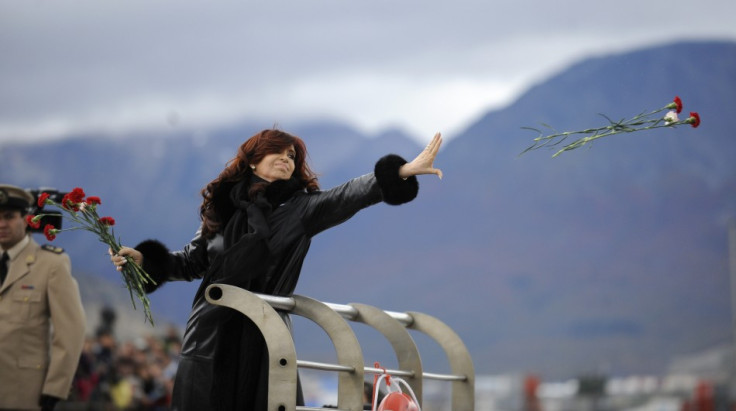Argentina, the Falklands and La Presidenta's Cheap Trick

Friday, 04 May 2012, marked the 30th anniversary of HMS Sheffield being hit by an Exocet missile launched from a Dassault-Breguet Super Étendard attack aircraft of Argentina's 2nd Naval Air Fighter Squadron. This went unmentioned in the British media except for a couple of clips in the City of Sheffield's local newspaper The Star.
Wednesday, 02 May marked the 30th anniversary of the sinking of the Argentine cruiser General Belgrano, torpedoed by the British hunter-killer nuclear-powered submarine HMS Conqueror. The number fatalities was 323 accounting for about half of Argentina's dead in the conflict. In Argentina, this anniversary received much more coverage.
An article in Wednesday's Buenos Aires Herald reported Defence Minister Arturo Puricelli telling a crowd gathered in the gardens of the Defence Ministry in Buenos Aires:
"Today's event is in memory of those who lost their lives as a result of the cowardly attack against the General Belgrano cruiser."
I must object to the Minister's description of the General Belgrano's loss when he describes it in terms of a "cowardly attack".
The General Belgrano and its escorts, though outside the Exclusion Zone, were in no way withdrawing from the conflict. Under international law an enemy ship's bearing and location is of no relevance with regard to engaging that enemy. Both General Belgrano's Commanding Officer, the late Captain Héctor Bonzo and the Government of Argentina, later publicly recognised the legitimacy of the attack.
Martin Middlebrook during the mid-80s wrote two books on the Falklands War, one from a British and Islanders' perspective and another covering the war as seen by Argentina. In his book The Fight for the Malvinas (1985) he quotes Admiral Allara, Argentine Task Force Commander:
"...the entire South Atlantic was an operational theatre for both sides. We, as professionals, said it was just too bad that we lost the Belgrano."
In war, sending up a decoy flight for the British combat air patrol to chase whilst two Super Étendards use the cover of the Falklands' terrain to "surprise attack" the enemy's ship is ethically no different from the British use of the submarine; that's tactics and to my knowledge no-one in Britain has accused the Argentine pilots who carried out the mission, or the crew of the refueling tanker needed in the operation or ground support staff amongst many others, of being cowards.
For all those not tuning in to the Argentine media, the coverage that has received a deal of notice since 02 May is a clip of one of the country's London Olympics hopefuls working out in the Falkland Islands. Filming "in secret" during an Islands' marathon according to the Buenos Aires Herald, Fernando Zylberberg, the captain of Argentina's field hockey team was shown "training" for the London Olympics in Port Stanley, the Islands' capital. The advert, made for the Argentine Government, ends with a slogan apparently later dubbed over it:
"To compete on English soil, we train on Argentine soil."
What made a somewhat tawdry gimmick more objectionable was Mr Zylberberg showing his contempt for the British and Islands' war dead when he used the war memorial in Port Stanley as a step-up exercise prop.
All part of President Cristina Fernández de Kirchner's renewed attack on Britain maintaining "colonial enclaves", and challenging the UK Government to open up discussions on the Islands' sovereignty. Setting aside diplomatic protocol, it was also a demand made by the newly appointed Argentine Ambassador, Her Excellency Alicia Castro on 01 May. During a human rights conference in London she persisted in pressing for an answer from William Hague, Britain's Foreign Secretary:
"...Are you ready for dialogue? Are we going to give peace a chance?"
With the Government of Argentina advocating a boycott of British goods and companies, nationalising Spanish oil and gas company Repsol YPF's assets - Repsol plan to sue Argentina at the World Bank Court - threatening firms that deal with the Falkland Islands and to cut the Islands' air routes, it's just possible that economic problems are brewing in Argentina. But until the people of the Falklands themselves express the desire to become part of Argentina, making this such a bone of contention is only to Britain's inconvenience and Argentina's greater loss.
© Copyright IBTimes 2025. All rights reserved.






















